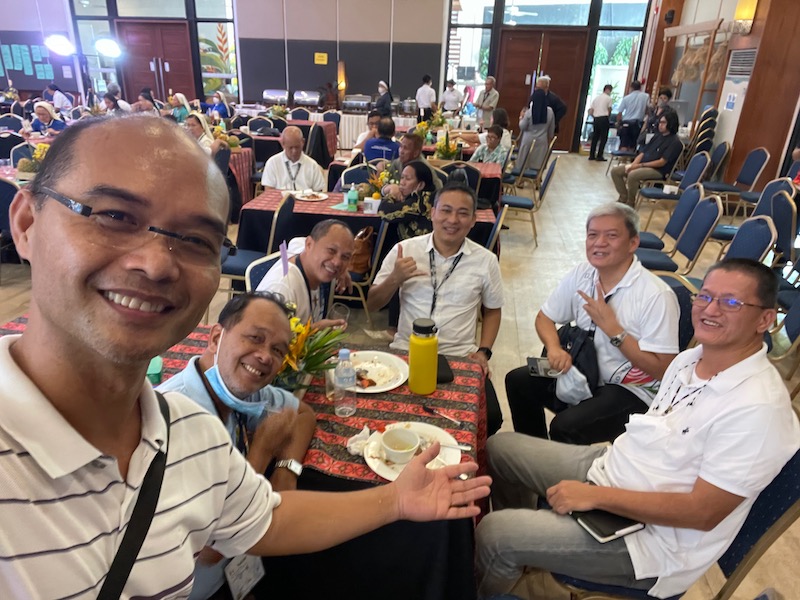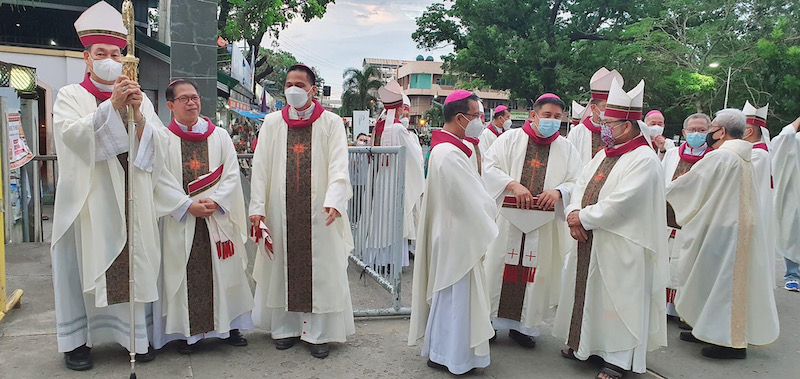
Part 4
(This is the fourth part of the presentation of Fr. Reynaldo D. Raluto on “Integral Ecology Ministry in Mindanao Context” at the 17th Mindanao-Sulu Pastoral Conference in Cagayan de Oro City on November 7 to 10, 2022)
LIBONA, Bukidnon (MindaNews / 04 December) — To continue our exploration of the best ecological practices of other ecclesiastical sub-regions, there are two important material sources: one is the pre-MSPC reports on the results of their diocesan and sub-regional meetings, and the other is their respective Synodal Syntheses both in the diocesan and sub-regional levels. It should be noted that, as of this writing, some ecclesiastical sub-regions (e.g., DaDiTaMa and DOPIM) have not yet submitted the report of the best ecological practices of their sub-regions. Moreover, other ecclesiastical sub-regions (e.g., KidMaCo and ZamBaSulI) hardly mention in their respective Synodal Syntheses anything about ecological concerns. Let us bear in mind these material limitations as we present their best ecological practices.
Kidapawan-Marbel-Cotabato (KidMaCo) Dioceses
The Diocese of Marbel Synodal Synthesis highlights the intimate connection between ecological and social concerns: “Side by side with the promotion for environmental protection is the intentional inclusion of IP’s in the evangelization. They are not objects of evangelization and help from the church. They are part of the church.”
Moreover, Marbel’s synodal synthesis courageously states: “we continue to oppose any destructive mining activities like open pit and coal plant in the diocese as well as promote the program on mini forest in the parish.” To mitigate the ecological disasters, the diocese expresses its “interest [in] introducing the creation of a mini forest within the parish vicinity. The thought creates an impetus for action to have this realized among the people given the reality that the Diocese is taking its strong stance against imminent environmental degradation due to open-pit mining issues in Tampakan.” (Marbel Synodal Synthesis, p 7).
Furthermore, Marbel’s care for our Common Home is also revealed in its Ecology Center that promotes Farm and Mini-forest where indigenous trees are planted. Its ecological programs include: (1) “Tree Growing” program for each parish; (2) requiring each parish to put up a tree nursery inside the parish compound; (3) observing proper waste management; (4) ongoing education on ‘Laudato Si’’ in every Parish; and (5) pushing each GKK to plant 500 Trees as its way to celebrate the 500 years of Christianity in the Philippines. (From the Report of Marbel’s Best Practices).

The Archdiocese of Cotabato has a GCash program of giving 1 million bamboo seedlings/cuttings to be planted in the BARMM area. The archdiocese expressed its commitment to facilitate and supervise this project. Moreover, the Queenship Parish of Lebak, Sultan Kudarat launched its Oplan Tree Planting Activity on August 6, 2022 in collaboration with the Lebak LGU, MENRO and DA. (From Cotabato’s Report on Best Practices)
In the Diocese of Kidapawan, all the parishes “have assiduously practiced the tree planting activity, as a feasible way of environmental protection and preservation. In fact, this said activity has been practiced not only at the parish level but also at the GKK level, as well as at the family level. Aside from tree planting and bio diversity, there are visible and prevalent activities in the GKKs such as: planting of medicinal and herbal plants and making vegetable gardens.” (From the report on Best Practices: Kidapawan Diocese, p. 2).
Zamboanga-Basilan-Sulu-Ipil (ZamBaSulI) Dioceses
Among these four dioceses in the ZamBaSulI region, only Zamboanga has submitted a report, which highlights its successful ecological activities, including tree planting participated by Priests, Religious, Teachers, Youth and Lay Faithful. Its archdiocesan Social Action Center-Justice, through the advocacy on Peace and Integrity of Creation, gives important attention to the urgent responses to the challenges of Laudato Si’ on how to prevent the increasing threat of Climate Emergency. The archdiocesan annual gathering, known as ZAMSAGA (Zamboanga Social Action General Assembly), highlights the information and education campaign on the issue of climate change and the Rights of Nature. (From Zamboanga’s Report on Best Practices).
Like that of the KidMaCo’s, the ZamBaSulI’s Synodal Synthesis also hardly mentions anything about ecological concerns, even if some of their member dioceses have explicitly mentioned them in their individual synodal synthesis.
Davao-Digos-Tagum-Mati (DaDiTaMa) Dioceses
It’s unfortunate that we have not received the sub-regional reports on best ecological practices from DaDiTaMa dioceses. Nevertheless, their sub-regional synodal synthesis contains two significant sections on ecological concerns. One is On Nature and Care for our Common Home that states: “A growing awareness of the urgent need to take care of our common home, the earth, is palpable in the local Church. It is evidenced by the various initiatives by different institutions, starting with those under the tutelage of the Church, the parishes, BECs, schools, religious congregations, and the collaborative efforts with other institutions and the government. All of these efforts are geared towards enhancing continuous and comprehensive programs for protecting the environment and contributing to solving global warming and other social-economic concerns. Concrete examples of this engagement with the care for our common home are the establishment of the Parish Disaster Action Response Teams (PDART), backyard gardening, tree planting, and nurturing.” (DaDiTaMa Synodal Synthesis,p.6).
The other section of DaDiTaMa’s synodal synthesis contains its commitment to Give Attention to the Care of the Environment, which is implemented by “Initiating efforts towards environmental protection, especially on the growing concerns on global warming, and actively engage in social, cultural, economic and political issues by providing a balanced outlook and moral guidance as stewards of creation.” (DaDiTaMa Synodal Synthesis, p. 10).

Dipolog-Ozamiz-Pagadian-Iligan-Marawi (DOPIM) Dioceses
The Synodal Synthesis of DOPIM contains an important section on the “Call for ‘Ecological Conversion,’” which is a quotation from the Diocese of Pagadian Synodal Synthesis (see pp. 7-8): “Propelled by the fruit of its worships, the Church goes out and fights for the protection of human and ecological rights. The Social Action Ministry in the Dioceses serves as the active hands of the Church in its care for the victims of human rights, which in most cases are the poor. The Church also is vocal in its condemnation of the destruction of the environment by rallying against the operation of the mining industry. The Church is serious about preserving the land by giving a series of seminars on sustainable agriculture as an alternative to the commercial way of farming which is believed to have poisoned the land. … A comprehensive program for environmental protection exists only in parishes that have faced a threat of environmental destruction. However, such is absent in parishes that do not consider environmental protection a felt need.” (DOPIM Synodal Synthesis, p. 12).
Among the DOPIM dioceses, the Diocese of Iligan’s synodal synthesis is worth noting here as it sadly recalls its “its own share of natural calamities such as typhoons and heavy floods. In these situations, the local Church responded to those who were badly affected. Through the Social Action Program, the parishes reached out and provided immediate needs to the most affected population. In collaboration with generous institutions, the Diocese had provided a housing project for the victims of heavy floods in 2011.” (Diocese of Iligan Synodal Synthesis, p. 11).
Critical Remark
After exploring the existing best ecological practices in Mindanao dioceses, it is good to ask whether they are sufficient to mitigate the present challenges of ecological crisis. In his comment on my Facebook post on November 8, 2022, Bro. Karl Gaspar critically stated: “I hope this MSPC can recapture the fire of those of the first conferences & deal boldly with our urgent ecological issues. Kay sa tinuod lang LUYA kaayo atong tubag sa hagit sa kinaiyahan!”
Bro. Karl’s use of the image of fire to describe the transformative passion of the first MSPC triennial meetings reminds me of Jesus’ challenging words in the Gospel of Luke: “I have come to set the earth on fire, and how I wish it were already blazing!” (Luk 12:49). We know that Jesus’ use of the image of fire here describes his burning desire to spread God’s Reign.
Similarly, it is also hoped that our present generation has this burning desire to passionately spread the fire of ecological ministry in our respective dioceses. Let us allow the transformative fire of ecological conversion to purify Mindanao from the prevailing unsustainable and destructive practices!
[MindaViews is the opinion section of MindaNews. Reynaldo D. Raluto is currently the parish priest of Jesus Nazareno Parish in Libona, Bukidnon in the Diocese of Malaybalay. He has also been serving as chair of the Integral Ecology Ministry of his Diocese since June 2022. Fr. Rey holds a doctorate in theology from the Katholieke Universiteit Leuven (Belgium) in 2011. Since 2011, he has been serving as Academic Dean of St. John Vianney Theological Seminary in Cagayan de Oro where he also teaches fundamental/systematic theology and Catholic social teaching. Among his ecological advocacies are planting/growing Philippine native trees, mountain climbing, and active participation in the cultural and ecological activities of the indigenous people apostolate (IPA) of the Diocese of Malaybalay. He is the author of the book Poverty and Ecology at the Crossroads: An Ecological Theology of Liberation in the Philippine Context (Quezon City: Ateneo de Manila University Press, 2015)|







